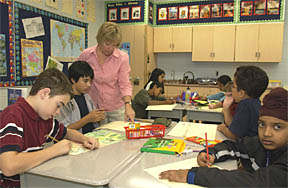|
By
Leanne Miller
In 2000,
nearly 5,000 teachers took an Additional Qualification (AQ) course in
special education. Patricia Goldblatt, a program officer at the Ontario
College of Teachers, notes that special education courses regularly have
the highest enrolment of any AQ courses. The teacher says, "Teachers
see special education training as vital to being a good teacher."
In 2003, new special education courses will start-a result of the College's
18-month review of the guidelines for all AQ courses. For the first time,
teachers actively took part in the revision and writing process. Other
stakeholders participated as well, including members of Special Education
Advisory Committees, professionals from the Ministry of Education, parents
and members of organizations representing disabilities and special needs.
As they worked, the writing team kept two important factors in mind: meeting
the needs of both the whole child and the teacher and remembering the
importance of advocacy for these students.
Revised Courses More Integrated
The major change to the special education AQ course guidelines is that
all five areas of exceptionality are included in all course material.
No longer are there core and elective courses focusing on particular exceptionalities.
According to Deirdre Smith, manager of the Standards of Practice and Education
Unit at the College, this reflects the strong desire that teachers expressed
for the courses to take a holistic approach and to ensure that teachers
were exposed to all exceptionalities.
Teachers may still focus their research and specialist course work on
a particular exceptionality.
The College has proposed adding five courses to the three-part Special
Education AQ. Those courses would be included in Schedule C of Regulation
184/97.
All three parts of the new course guidelines will be released in January
2003. Part 1 will be phased in starting in January, 2003. Anyone taking
Part 1 in the fall of 2003 will follow the new guidelines.
Part 2 and Specialist will be phased in over the next several years. However,
some faculties of education may continue to offer these courses using
the previous guidelines during the transition period in order to enable
members to complete their course work under the old model.
The Special Education Teacher
The new AQ course guidelines reflect key descriptors of an exemplary special
education teacher. None of the descriptors is new, as good teachers have
always modelled these qualities:
Educated and reflective: Much information is available on
exceptional students from research, best practices, parents and organizations.
Teachers keep abreast of the deep and growing knowledge base, are aware
of the acts and regulations affecting special education and integrate
all this information into their practice.
Focused on the individual needs of students: Teachers realize
that every child possesses a unique set of abilities and challenges that
must be addressed in the most appropriate and individual manner. At the
same time, students receive an integrated education that encourages them
to interact and learn from and with their peers. The focus is on the whole
child.
Collaborative: The classroom teacher's enormous responsibility
and challenge of educating exceptional children and ensuring that they
receive positive learning experiences is best shared with other teachers,
teaching assistants, professionals throughout the board and parents.
Advocate: Teachers, along with parents and the child, must
advocate for what is best for each child. Teachers work to enable students
to advocate for themselves and become independent risk-takers.
More Changes
Other changes to the AQ course guidelines include a clear description
of learning expectations and alignment of course work with the Standards
of Practice for the Teaching Profession and the Ethical Standards for
the Teaching Profession. An individual project is a major component of
each course.
Projects will involve high-level thinking, research and a demonstration
of communication skills as related to a specific exceptionality or exceptionalities
based on experiential practices introduced in Part I. Assessments may
include performance or written assessments, written tests, oral presentations,
portfolios or action research.
Special Education is now one of the seven mandatory professional learning
areas for teachers. Each AQ course will give teachers four credits toward
the required 14 courses of professional learning.
As part of the numerous changes made to Additional Qualification course
guidelines by the Standards of Practice and Education Committee, the Council
has also recommended to change the regulation that would require special
education to be a core area in pre-service teacher education when it is
approved.
This is currently the case at some faculties, including the University
of Windsor, where pre-service students have a compulsory 16-week survey
course in special education. Many of the stakeholders told the College
to ensure that all new teachers are better prepared to meet the needs
of students with learning exceptionalities integrated into their classroom.
As Goldblatt sums it up: "All teachers will benefit from these courses
because they are based on sound pedagogy that is appropriate for all students."
In January you will be able to preview the new Special Education AQ course
Guidelines by visiting the College
web site.
|
![]()
